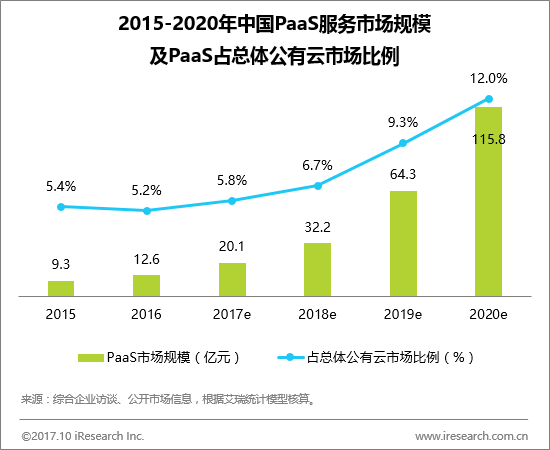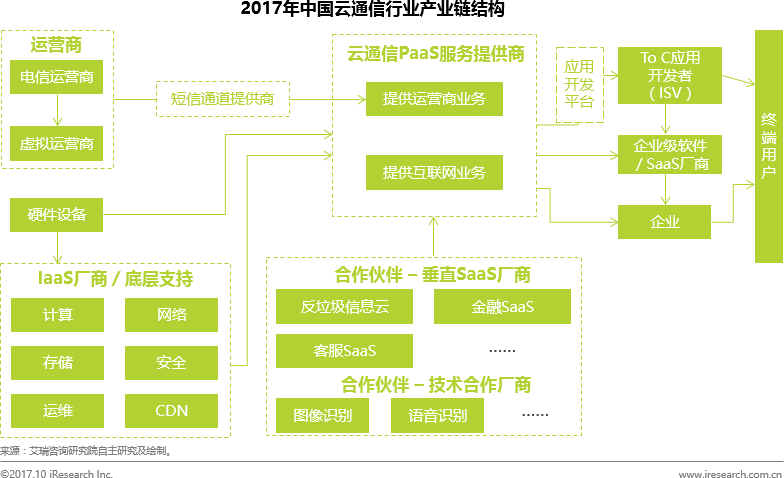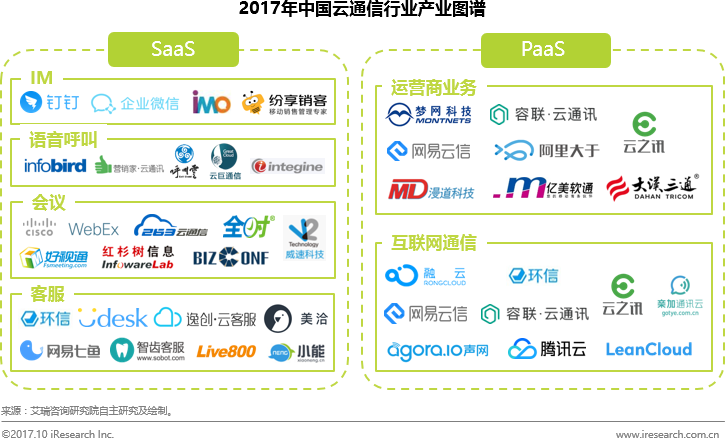Introduction:As a vertical field in the cloud service market, cloud communication is the business of packaging (or providing interfaces) communication functions (SMS, phone, Internet instant messaging, etc.) to developers.
Introduction: The concept of social division of labor embodied in cloud services has had a profound impact on social development. As a vertical field in the cloud service market, cloud communication focuses on communication functions (SMS, phoneinternetInstant messaging, etc.) business of packaging (or providing interfaces) and delivering to developers. After years of development, the domestic cloud communication market is gradually becoming mature, and powerful manufacturers are gradually emerging from the market and trying to break through the inherent boundaries between SaaS and PaaS.
APIWith the advent of economy, the domestic PaaS market has a promising prospect
In a broad sense, the concept of "cloud communication" can include communication cloud services of PaaS layer and SaaS layer, that is, all cloud services related to communication, including SMS platform, cloud call center, customer service system, cloud video teleconferencing system, etc., can be classified as cloud communication. But in general, since the communication services of the SaaS layer belong to a more vertical classification system, "cloud communication" generally refers to the communication services of the PaaS layer.
For PaaS layer services, the most common delivery methods are SDK and API. Cloud services realize the sharing of IT resources and capabilities, which is a good practice of the concept of social division of labor. Through the API interface, developers can quickly build the product architecture like building blocks, greatly reducing the development cost and threshold. After more than a decade of development, PaaS has gradually increased its share in the overall public cloud market. With the advent of API economy, PaaS is expected to usher in a broader development space, which will also drive the cloud communication industry to a higher level.

Stimulated by multiple factors, cloud communication development ushers in good opportunities
1. Policy support and regulation. The primary positive factor for the development of the cloud communication market lies in the policycloud computingThe importance and support of the industry. In recent years, from the documents of the State Council to the "13th Five Year Plan" of the national will, to the relevant policies of the Ministry of Industry and Information Technology and local municipal governments, cloud computing has been increasingly valued and strongly supported. At the same time, the Ministry of Industry and Information Technology has also successively issued policies to regulate the sound development of cloud computing industry, such as establishing unified standards for cloud computing and cloud services, and regulating market operations; And the vigorously promoted spam SMS governance action effectively solved the chaos of the SMS market before.
2. The network infrastructure is perfect. Thanks to strong policy promotion, China's network infrastructure construction has made remarkable progress. Basic telecom enterprises accelerate the construction of mobile networks, including3G/The number of 4G base stations has nearly tripled in six years. At the same time, transmission network facilities have also been constantly improved. In 2016, the total length of optical cable lines in China exceeded 30 million kilometers, more than twice as much as that in 2010. With the improvement of network coverage and communication service capability, the number of 3G/4G subscribers of China Mobile has grown rapidly in recent years, reaching 940 million by the end of 2016, accounting for more than 70% of the total subscribers.
3. The upstream and downstream industries are developing rapidly. In recent years, Alibaba CloudtencentThe development of IaaS service providers led by Cloud has become increasingly mature in China, laying a good foundation for the development of cloud communications in the downstream PaaS and SaaS layers. The social networking, live broadcasting, education and community network economies in the downstream industries are all in a rapid development stage, bringing a large number of customers and broad market space for cloud communication enterprises.
4. The business of traditional operators is facing transformation. According to the statistics of the communication industry released by the Ministry of Industry and Information Technology, the number of point-to-point short messages between traditional individuals has declined year by year, and the proportion of the total number of mobile short messages is expected to be less than 30% by 2016. On the other hand, the number of non point-to-point short messages dominated by enterprise short messages (industry short messages) remained stable and increased slightly. At the same time, the telecom revenue structure continues to tilt to Internet access and mobile traffic services, and the proportion of voice revenue has dropped to 25% of the total revenue. The traditional personal SMS and voice services are significantly affected by Internet communication, and the business scale has no chance to recover. The focus of traditional operators' business is bound to gradually shift to enterprise oriented services.
With the help of upstream and downstream industries, the market pattern is becoming clearer
From the perspective of the overall industrial chain of the cloud communication industry, upstream hardware equipment manufacturers and IaaS manufacturers provide cloud communication PaaS service providers with support from physical equipment to computing, network, storage, security operation and maintenance and other Internet underlying resources, while manufacturers providing SMS and voice cloud communication services also need to obtain low-cost resources in batches from the three major operators (or virtual operators, channel providers). The partners of cloud communication manufacturers generally include SaaS manufacturers and technology partners of other vertical businesses to improve their own businesses and service levels. The services of cloud communication manufacturers are not only for independent application developers or integrators, but also directly for enterprises, providing solutions face to face from the enterprise business logic.

After years of market development, today's cloud communication market has gradually ended the stage of "mass brawling", and the market competition pattern is becoming increasingly clear. From the PaaS layer alone, Mengwang Technology has a great resource advantage in the operator business by virtue of its good relationship with mobile operators; At the same time, some manufacturers engaged in Internet cloud communication business also started to set foot in SMS verification code, call center and other businesses. After industry reshuffle, some Internet service (i.e. IM cloud) manufacturers have left behind or chosen to transform, while the powerful IM cloud service manufacturers led by Rongyun have firmly occupied the market; Of course, some Internet giants also develop their own cloud communication services, but most of them are still used for internal applications of the group, and the pace of opening up is not obvious.
